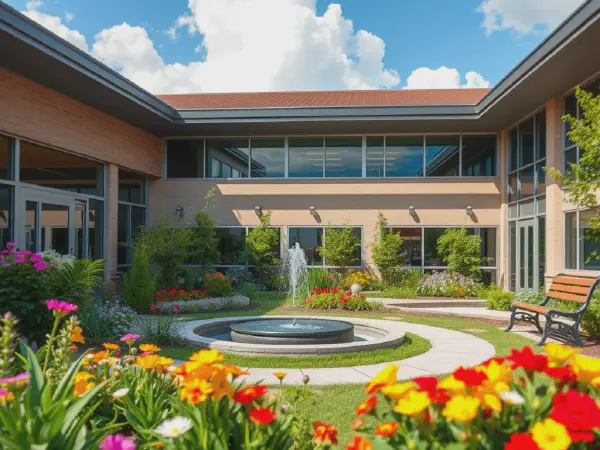Transform Your Life: Benefits of Outpatient Rehab in Newark

Understanding Outpatient Rehab: A Path to Recovery
Outpatient rehab is a treatment program designed for individuals struggling with substance abuse or mental health issues who do not require 24-hour supervision. This flexible approach allows individuals to attend therapy sessions while continuing to live at home and manage their daily responsibilities. Outpatient rehab can be an effective option for those who seek to overcome challenges related to addiction or mental health, providing essential support and guidance throughout the recovery journey.
One of the primary benefits of outpatient rehab is its accessibility. Programs are often tailored to fit the needs of the individual, making it easier for them to engage with the treatment process. Sessions can vary in intensity, from few hours per week to multiple sessions, allowing for a customizable experience based on the patient's specific needs. Unlike inpatient programs, outpatient rehab supports individuals in creating a balanced routine that includes therapy, work, and family commitments, promoting a smoother transition back into daily life.
Moreover, outpatient rehab can serve as an essential step for individuals completing an inpatient program. After experiencing intensive treatment, individuals may find the structure and support offered in outpatient rehab beneficial for maintaining their progress and preventing relapse. The gradual return to autonomy paired with professional support can help individuals strengthen their coping mechanisms, develop healthier habits, and build a solid foundation for long-term recovery.
The success of outpatient rehab lies in the personalized treatment plans tailored to each individual's needs. These plans often incorporate a variety of therapeutic approaches, including individual therapy, group therapy, and family therapy. This diversity allows patients to engage in different therapeutic modalities that resonate with them, ensuring a comprehensive treatment experience that addresses the root causes of their challenges and helps develop effective coping strategies.
Overall, outpatient rehab represents a vital resource for those seeking recovery and support without the need for full-time hospitalization. By providing flexible options, personalized treatment, and encouragement to remain actively engaged in their everyday lives, outpatient rehab is an invaluable component of the continuum of care for individuals facing addiction or mental health challenges.
Accessibility of Outpatient Rehab in Newark
In Newark, outpatient rehab programs are readily available, making them convenient for local residents. The city's healthcare facilities, community centers, and specialty clinics offer a range of outpatient services that cater to various needs, ensuring that individuals have access to the resources they require to foster their recovery journey.
Transportation options in Newark further enhance the accessibility of outpatient rehab. Public transit systems, including buses and trains, provide individuals a reliable means to reach their therapy sessions. Additionally, many treatment centers offer assistance with transportation or collaborate with local organizations to ensure participants can attend their appointments without difficulty.
Outpatient rehab provides flexible treatment options for those seeking recovery while maintaining their daily responsibilities, as detailed at https://www.addictioncenter.com/treatment/outpatient-rehab/.
Flexible scheduling options in Newark's outpatient rehab programs enable individuals to arrange sessions that fit within their busy lives. Many facilities offer evening and weekend appointments, allowing participants to attend therapy without disrupting work or family obligations, a crucial factor in maintaining commitment to the recovery process.
Cost-Effectiveness of Outpatient Rehab in Newark
Outpatient rehab programs in Newark tend to be more cost-effective compared to their inpatient counterparts. Because patients are not confined to a facility and can maintain their daily lives, the overall expenses associated with outpatient treatment are significantly lower. This affordability makes treatment accessible to a broader range of individuals seeking help.
Insurance coverage for outpatient rehab is another factor that contributes to its cost-effectiveness. Many insurance plans include coverage for outpatient services, reducing the financial burden on individuals and families, making it easier for them to access the necessary support for recovery.
Additionally, financial assistance programs are available for eligible participants in Newark. Various non-profit organizations and treatment centers offer sliding-scale fees or scholarship programs, ensuring that cost does not become a barrier for those wanting to seek treatment and achieve a healthier lifestyle.
Personalized Treatment Plans in Outpatient Rehab
Outpatient rehab stands out for its emphasis on personalized treatment plans. Each participant receives tailored therapy sessions based on their unique history, challenges, and goals. This individual-centric approach ensures that therapy is relevant and effective, enhancing the likelihood of successful outcomes.
In addition to individual therapy, many outpatient rehab programs incorporate family therapy options. This inclusion acknowledges the importance of family dynamics in the healing process, encouraging open communication and support among loved ones. By involving the family, participants can create a supportive network that positively influences their recovery journey.
Continuous feedback and adjustment of treatment plans are key features of outpatient rehab. Therapists regularly assess progress and may modify the plan based on the participant’s evolving needs, ensuring that the treatment remains effective and appropriately challenging throughout the recovery process.
Community Support in Outpatient Rehab
Access to local support groups is an essential component of outpatient rehab. Many programs connect participants with community resources, including support groups such as Alcoholics Anonymous (AA) or Narcotics Anonymous (NA). These gatherings provide a safe space for individuals to share their experiences and challenges and receive encouragement from those who understand their journey.
Building connections with peers is also a notable benefit of outpatient rehab. Sharing experiences with others who are facing similar challenges fosters a sense of belonging and encouragement, reducing feelings of isolation and loneliness. These peer connections are vital for maintaining motivation and commitment during recovery.
The involvement of family in the outpatient rehab process further strengthens community support. Families are often encouraged to participate in family therapy sessions and support groups, fostering relationships based on understanding and healing. Involvement helps ensure that the individual feels supported both inside and outside of their treatment environment.
Success Rates of Outpatient Rehab Programs
Statistics indicate that outpatient rehab programs hold favorable success rates in recovery outcomes. Research shows that many individuals who complete outpatient treatment sustain long-term recovery, demonstrating the effectiveness of this model. Family dynamics, community connections, and personalized care play substantial roles in boosting these success rates.
In terms of long-term effectiveness, studies reveal that outpatient treatment outcomes can be comparable to those seen in inpatient programs, particularly for individuals with less severe dependencies. As patients build their support systems and coping strategies in their everyday environments, they are often better equipped to handle challenges post-treatment.
Testimonies from program graduates further highlight the successes of outpatient rehab. Many individuals attribute their recovery achievements to the flexibility and accessibility of outpatient programs, sharing firsthand experiences of how personalized treatment and community support contributed to their successful journeys towards healing.
